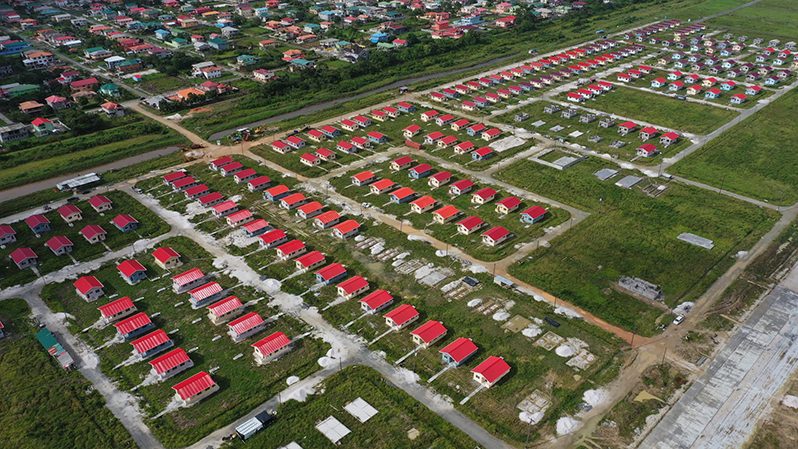–Minister McCoy says
THE People’s Progressive Party/Civic (PPP/C) administration’s focus continues to be people-centered, based upon an understanding that development must be for all, especially given the unique transformative opportunities that Guyana has seen in recent years, Minister within the Office of the President Kwame McCoy has said.
The minister, in his response to the Stabroek News column, “The minority report”, said the government’s approach to development is felt across all sectors of the economy, particularly the housing sector, which has a programme that has been revitalised with the return of the PPP/C’s administration to office.
“Given the recent successful removal of the Mocha squatters, who were preventing the completion of the much-needed new East Bank Demerara highway, there has been an increased spotlight on the issue of squatting.
“Notwithstanding, there is the misplaced view being peddled by the APNU+AFC and certain political actors that squatting must be seen as the acceptable way, as though it is an innate right for Guyanese to set up makeshift structures on private and State-owned lands for the purpose of squatting,” Minister McCoy said.
This “flawed view”, he related, is being amplified by columnists and commentators such as the Stabroek News’ ‘The Minority Report’, which is penned by Akola Thompson.
“Squatting is illegal, and there can be no justification for doing so. Not surprisingly, the PNC-led opposition and columnists are dog-whistling with the narrative which suggests that only Afro-Guyanese are squatters, and are disadvantaged from accessing financing.
“Persons who support this view are drawing upon outdated studies and reports, and they are equally culpable for encouraging families to remain impoverished by squatting in some of the most deplorable conditions,” Minister McCoy lamented.
The approach to housing development is not more squatting; it never was, and it will never will be, he affirmed.
Guyana’s housing programme suffered major setbacks as a result of the APNU+AFC’s lackluster approach that reduced Guyanese seeking land to “beggars in their own homeland”.
According to Minister McCoy: “Ordinary Guyanese were punished, as there were no attempts to address the financial disparity in homeownership. Instead, the ‘Coalition’ focused on enriching themselves, their families, and a few of their elite friends.
“A mere 5,000 house lots were distributed during the five years of the APNU+AFC administration. During this period, the coalition also gifted acres of commercial land, twice the size of Barbados, to its few friends.”
Since returning to office in 2020, after fending off an undemocratic attempt to rig the elections, President Dr. Irfaan Ali has delineated a pragmatic and inclusive agenda that addresses the decades-old issue of squatting through the opening up new lands for affordable housing development, with accompanying infrastructural works to ensure roads, water and electricity are provided.
Last year, the Central Housing and Planning Authority (CH&PA) surpassed the target of 10,000 house lots distribution that pushed the total number of allocations over 20,000 in two years.
Currently, hundreds of housing units are being constructed across Regions Three, Four, Six and 10, targeting low and moderate-income families, as well as young professionals. And, the President’s vision for building a massive new city along the Soesdyke-Linden Highway will see major progress in 2023.
The government has designed a new initiative to assist Guyanese families who own government or private lands to access financing and build their homes. Through this programme, applicants could select from three pre-designed housing models of $7 million, $9 million and $12 million, and pre-qualify for loans with financial institutions.
“Several banks are supporting the initiative that will also lend technical support to homeowners, as homes will be built by contractors, and monitored by engineers of the Central Housing and Planning Authority for quality control,” Minister McCoy said.
He reiterated that the PPP/C has a proven track record of addressing squatting.
Currently, there are 175 areas that have been identified by the government for the purposes of regularization, and, so far, over 21,000 households have either been regularised or relocated to titled lands.
“Government’s thrust is to end squatting by providing avenues to legal homeownership,” the minister affirmed.



.jpg)








